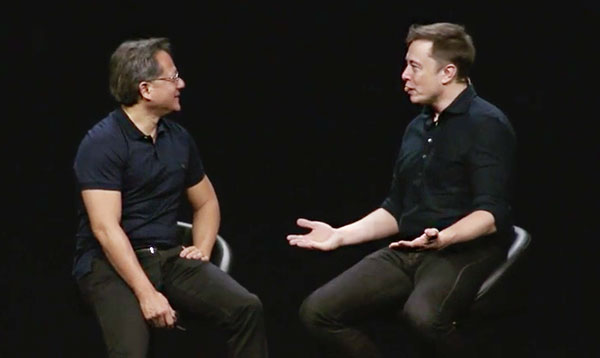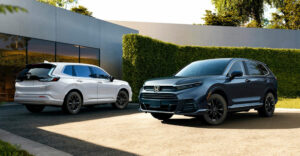There will come a time, in a future not so far away, when it will be illegal for the average person to drive a car, predicted Tesla CEO Elon Musk.
Autonomous vehicles will be exponentially safer, he said Tuesday at Nvidia’s 2015 GPU Technology Conference in San Jose, California.
Nvidia CEO Jen-Hsun Huang took the stage with Musk for an unrehearsed conversation about the future of cars and Tesla’s aspirations to propel its electric vehicles into fully autonomous territory.
Huang touched on Musk’s well-publicized warnings that super-sentient machines could become smarter than humans and pose a grave danger to humanity, but Musk said he was optimistic about automotive artificial intelligence, because it’s “more narrow.”
Musk expressed his enthusiasm for a future when people can do less — presumably without giving up control over the machines that take over their most tedious chores.
Ban on Human Drivers
Motoring will become much safer when steering duties are taken out of human hands, according to Musk.
“In the distant future, I think people may outlaw driving cars because it’s too dangerous,” he said during the interview. “You can’t have a person driving a two-ton death machine.”
It’s going to take a significant amount of time to wrench the wheels out of the hands of motorists, though, because there are plenty of people who are in love with the driving experience, suggested Frost & Sullivan Research Manager Praveen Narayanan.
“[Eliminating] the human will take a lot more time, because the user has to have confidence in the car driving itself completely on all roadways, any time of the day, any weather condition, etc.,” he told TechNewsWorld.
Although Google and original equipment manufacturers have been working to eliminate human error through self-driving tech, trust is an issue, noted Narayanan.
Automated driving will be available in select Volvo cars in Gothenburg, Sweden, but both Volvo and the city’s central traffic command center can shut down automation when the weather turns bad or any other roadway threats emerge, he said.
If human drivers are taken out of the picture, a lot of things will change, Narayanan pointed out.
Will “insurance companies insure these self-driving algorithms instead of us as drivers?” he wondered.
Rules and Responsibilities
Driverless cars will disrupt the insurance industry, prompting a hard shift in the way coverage is offered, according to Mitch Wein, Novarica’s vice president of research and consulting.
Insurances policies will switch lanes from personal lines of coverage to commercial policies, as the accountability for accidents shift from drivers to vehicles and the companies that manufacture them, he told TechNewsWorld.
“As most vehicles become driverless between 2020 and 2035, the number of personal lines providers will substantially contract. Watch out — future shock is right around the corner,” Wein warned.
As for regulating autonomous vehicles, lawmakers will mandate new rules two or three years after the industry has reached the point when driverless cars are undoubtedly safer than vehicles driven by people, according to Musk.
Right now, it’s still unclear how the regulatory environment for driverless cars will develop, observed Brandon W. Mason, PricewaterhouseCoopers senior manager and leader of Autofacts Americas. It could grow from rules established at the national or local level.
“There are multiple, complex issues that must be addressed, including safety, infrastructure and communication: vehicle to vehicle, vehicle to grid, etc.,” he told TechNewsWorld. “Market type — mature vs. emerging — will likely have an impact as well, whereas mature markets will be more likely to adopt standards early on, since they will hit a critical mass of autonomous vehicles sooner than emerging markets.”
Musk put the number of electric vehicles on the road today to somewhere around 1 percent.
It will take between 15 and 20 years to replace the current fleet of vehicles — roughly 2 billion — with EVs, and the same should be true of driverless cars, he said.
Leeway of about 15 to 20 years should give lawmakers plenty of time to pen effective legislation for driverless cars, but that doesn’t mean they will be clearcut and immune to addendums.
“Minimizing risk in terms of traffic accidents, emissions and other factors are some of the benefits being touted by advocates of autonomous vehicles,” said PwC’s Mason. “These benefits must also be balanced with existing fleet characteristics and consumer demand.”





















































I have a great deal of respect for Elon Musk – for what he is doing, not for his predictions. It’s always great fun to go back twenty years or more, and see what the "futurists" predicted. There can be some eerie prescience, but for the most part, they are wildly, and often hilariously, wrong. The self driving car is getting a lot of press these days, but I’ve read, and I tend to agree with these statements, that in actual fact the technology is decades away from being widely adoptable, let alone widely adopted. I don’t think most of us have to worry about losing our driving privileges for anything other than egregious driving offences, such as impaired driving, or going blind – at least not for the foreseeable future…
Point 1: EVs are a MAJOR source of pollution that devastates entire regions. What’s that you say? No? How can this be? They’re electric with no emissions right? Research the environmental destruction in China caused by mining and processing the rare earth minerals required to produce batteries. EVs may not pollute the regions in which they operate, but the manufacture of their batteries wreaks havoc on the environment. Musk….he wants to bring all that wholesome environmental goodness to U.S. soil by manufacturing batteries stateside. I’m not a fan of fossil fuel burning transportation. But then, I’m also not a fan of pretending that the alternative is an improvement, when recent history has shown us that it isn’t.
Point 2: While I respect much of his vision, on driverless cars I disagree. He’s an idiot…and I say that with all due respect. Automobiles have been manufactured for more than 100 years. "Computer" technologies for more than 50. Yet we still face (and feel the impact of) a seemingly uncountable number of manufacturing defects and technology "bugs" on a regular basis. I’m not looking forward to the press release from some autonomous vehicle manufacturer promising to investigate the bug or defect that caused a catastrophic failure resulting in an alarming number of deaths. They’ll be ready with one thousand excuses about what went wrong, and another thousand promises to make things right. That will not comfort the families of the people who lose loved ones due to a "bug". It’s one thing to arrest a DUI offender who killed an innocent, try, convict and lock him up for the rest of his life. Now imagine that the offender is a corporation. What do you think would happen? Arrests? Jail time? Forced closure of the company? Of course not. Litigation tied up in courts for years upon years. Maybe a paltry penalty. Perhaps a slap slap on the wrist and a stern warning.
Point 3: If I see this day coming in the U.S. it’ll be an indication that it’s time to leave the country. Frankly I wouldn’t care where we go. My motto would be "anywhere but here". Jefferson, Washington, Adams, Hamilton, Franklin….they’d be shocked by, ashamed of and disappointed in what we’ve become. Let’s not become that America.